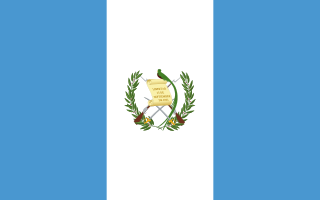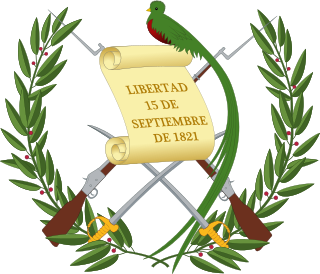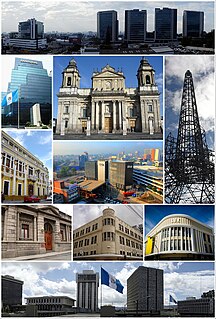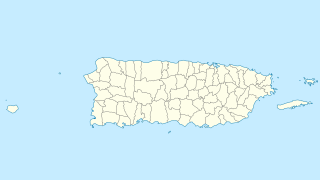
The Cerro Maravilla murders, also known as the Cerro Maravilla massacre, occurred on July 25, 1978, at Cerro Maravilla, a mountain in Puerto Rico, wherein two young Puerto Rican pro-independence activists were murdered in a Puerto Rico Police ambush. The event sparked a series of political controversies where, in the end, the police officers were found guilty of murder and several high-ranking local government officials were accused of planning and/or covering up the incident.
Julio César Méndez Montenegro was the Revolutionary Party President of Guatemala from July 1, 1966 to July 1, 1970. Mendez was elected on a platform promising democratic reforms and the curtailment of military power. The only civilian to occupy Guatemala's presidency during the long period of military rule between 1954 and 1986, Méndez was not allowed to act independently of the military and was widely considered to be a military puppet; Mendez had assumed the presidency under a pact in July, 1966 that gave the armed forces carte blanche with respect to internal security matters and an effective veto over governmental policy. He was the first cousin of César Montenegro Paniagua whose kidnapping, torture and murder during the Julio César Méndez presidency is rumored to have been undertaken with presidential sanction.
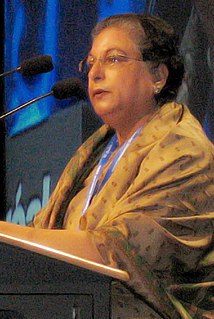
Hina Jilani is an advocate of the Supreme Court of Pakistan and a human-rights activist from Lahore in Punjab, Pakistan.

Álvaro Colom Caballeros is a Guatemalan politician who was the President of Guatemala from 2008 to 2012, as well as leader of the social-democratic National Unity of Hope (UNE).
The Argentine Anticommunist Alliance was a far-right death squad founded in Argentina in 1973 and particularly active under Isabel Perón's rule (1974–1976). Initially associated with the Peronist right, the organisation opposed the Peronist left and other leftist organizations. The AAA acted against a wide range of government opponents, not just communists.

Myrna Mack Chang was a Guatemalan anthropologist. In 1990 she was murdered by a military death squad because of her criticism of the Guatemala government's treatment of the indigenous Maya, and its human rights abuses against the people.
Right-wing paramilitary groups in Colombia are paramilitary groups acting in opposition to revolutionary Marxist-Leninist guerrilla forces and their allies among the civilian population. These paramilitary groups control the large majority of the illegal drug trade of cocaine and other substances and are the parties responsible for most of the human rights violations in the latter half of the ongoing Colombian Armed Conflict. According to several international human rights and governmental organizations, right-wing paramilitary groups have been responsible for at least 70 to 80% of political murders in Colombia per year. The remaining political murders are often committed by leftist guerrillas and government forces.
Thailand was among the first nations to sign the UN's Universal Declaration of Human Rights of 1948 and seemed committed to safeguarding Human Rights in Thailand. In practice, the reality has been that the powerful can abuse the human rights of their subjects with impunity. From 1977 to 1988, Amnesty International reported that there "...were 1,436 alleged cases of arbitrary detention, 58 forced disappearances, 148 torture [sic] and 345 extrajudicial killings in Thailand....The authorities investigated and whitewashed each case." Amnesty International's Amnesty International Report 2017/18; The State of the World's Human Rights demonstrates that not much has changed in the interim.

Colombia is a sovereign state situated in South America. It has been a member of the United Nations since 5 November 1945, and is party to a variety of international agreements concerning human rights. It also has a series of domestic laws concerning the protection of human rights. However, Colombia's human rights record often contradicts directly with the laws and agreements to which it is bound; Colombia is widely referred to as the country with the "worst human rights record in the western hemisphere". In the UK Foreign Office annual human rights report for 2010, Colombia features as one of 20 "Countries of Concern".

Otto Fernando Pérez Molina is a Guatemalan politician and retired military officer, who was President of Guatemala from 2012 to 2015. Standing as the Patriotic Party candidate, he lost the 2007 presidential election but prevailed in the 2011 presidential election. During the 1990s, before entering politics, he served as Director of Military Intelligence, Presidential Chief of Staff under President Ramiro de León Carpio, and as chief representative of the military for the Guatemalan Peace Accords. On being elected President, he called for the legalization of drugs.
John Fife is a human rights activist and retired Presbyterian minister who lives in Tucson, Arizona. He was a member of the Sanctuary Movement and was a co-founder of the immigrant rights group No More Deaths.
Helen Mack Chang is a Guatemalan businesswoman and human rights activist. She became an outspoken advocate for human rights after her sister, anthropologist Myrna Mack Chang, was assassinated by the Guatemalan military on September 11, 1990. She pursued prosecution of her sister's assailants, including ground-breaking cases in the Inter-American Court of Human Rights, achieving convictions of one assailant and a high-ranking colonel. The Guatemalan government acknowledged responsibility in 2004 and has paid compensation to Mack and her family.
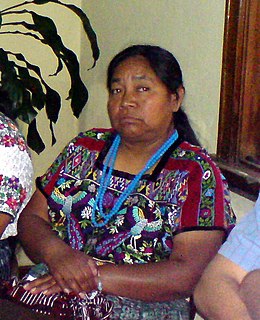
Rosalina Tuyuc Velásquez is a Guatemalan human rights activist. She was elected as a Congressional deputy in 1995, elected from the national list of the New Guatemala Democratic Front, and served as Vice President of Congress during that period. Tuyuc is a Kaqchikel Mayan.

Natalya Khusainovna Estemirova was a Russian human rights activist and board member of the Russian human rights organization Memorial. Estemirova was abducted by unknown persons on 15 July 2009 around 8:30 a.m. from her home in Grozny, Chechnya, as she was working on "extremely sensitive" cases of human rights abuses in Chechnya. Two witnesses reported they saw Estemirova being pushed into a car shouting that she was being abducted. Her remains were found with bullet wounds in the head and chest area at 4:30 p.m. in woodland 100 metres (330 ft) away from the federal road "Kavkaz" near the village of Gazi-Yurt, Ingushetia.
Capital punishment is a legal penalty in Guatemala, and is carried out by lethal injection and, to a lesser extent, the firing squad. It is only in military codes of justice, and was abolished for civilian offences in October 2017.

Norma Cruz is a Guatemalan human rights activist known for her work documenting violence against women.

The Survivors Foundation is an NGO located in Guatemala that aims to provide emotional, social and legal assistance to hundreds of women victims of violence, looking for justice and protection. The association is composed of women survivors of violence. It was founded in 2003 by Norma Cruz, women’s rights activist.
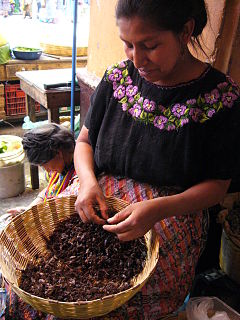
Violence against women in Guatemala reached severe levels during the long-running Guatemalan Civil War (1960-1996), and the continuing impact of that conflict has contributed to the present high levels of violence against women in that nation. During the armed conflict, rape was used as a weapon of war.
Environmental killings are murders or assassinations linked to environmental issues such as illegal logging, mining, land grabbing, and pollution. Victims have included not only environmental and land rights activists, but also members of indigenous communities and journalists who have reported on these issues.
Pepe Julian Onziema is an LGBT rights activist from Uganda. In 2012, he was named a Global Citizen by the Clinton Global Initiative for his work in human rights advocacy. He began his human rights work in 2003, which has twice led to his arrest. He has since participated in organizing gay pride celebrations in Uganda.
